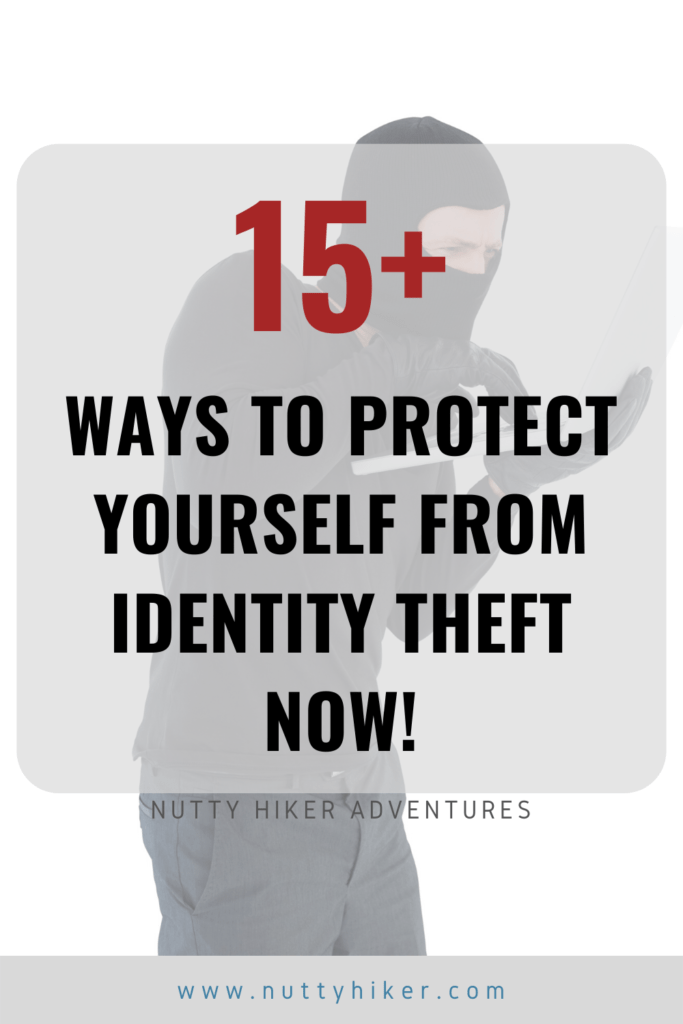What do you mean, identity theft and me? I am well protected; it won’t happen to me. Go ahead and keep lying to yourself. Identity theft is a lot easier to accomplish than you think, as the story below will show.
The Story of Sasha and Her Husband
Sasha had taken a 2-year private investigators course and was attending college studying to get her bachelor’s in Criminal Justice. She kept up to date on the laws and crimes here within the U.S., used a shredder for all mail, only bought online through reputable companies, etc….She believed that her own identity and that of her family were well protected. Apparently she should have been doing more.
Her husband had his identity stolen by his ex-wife, who refused to turn over her old military identification card to gain services in his name.
Sasha’s was stolen by, according to her local police department, a local Big Lots employee who disabled the self-service credit card reader at the counter. This made it so the customer would have to hand the credit card to the employee, who in turn made a quick impression of it before completing the transaction through the cash register credit card reader.
Thankfully, because Sasha was already aware of identity theft crimes, she was able to catch the theft of her identity within hours of it being used, which is key.
Sasha was able to recover 100% of her lost money.
Her husband’s identity theft was caught years later after ordering a credit report. Thankfully though, the creditors removed all bogus charges and instead went after the ex-wife, as did Tri-Care for insurance fraud. Although both ended well, the husband’s was a two-year process to clean up compared to the wife’s, which took a matter of just a week.
Catching the crime quickly is the key.
Unfortunately, happy endings like above are rare in Identity theft cases. As spouses of Servicemembers it is even more important to be vigilant in keeping not only your identity safe, but theirs as well.
Warning for Military Members
Look on your military identification card. What do you see? Your sponsor’s social security number. In previous years not only did it include their social security number but the social security number of the dependants as well. Update: All social security numbers have now been removed!
How to Protect Yourself from Identity Theft
1) Shred all incoming mail (yes even the junk mail).
2) Keep all sensitive paperwork locked away. Invest in a locking filing cabinet (or even better yet, a safe) and USE IT for all sensitive paperwork.
3) Never give out your Social Security Number unless absolutely necessary. Never give yours or your spouse and/or children’s social security numbers out to anyone. If you are asked for it, ask why they need it and what they will use it for. Be wary of anyone calling you asking you for your social security number. They are usually scammers just looking to commit identity theft.
4) Check your bank account transactions daily. Immediately call your bank if you do not remember making a transaction. (This also goes for credit card accounts).
5) Check your credit reports at least twice a year. Call all creditors listed that you do not recognize. Ask for proof of the debt. By law you can obtain one (1) free credit report from all three bureaus every year. Just go to AnnualCreditReport.com to get your free copy.
6) Never hand your credit/check card to a cashier (see the story above, the cashier quickly made an imprint without anyone noticing). Instead, use the self-service one at the counter to swipe the card yourself.
7) Check for skimming devices. If it looks like a device has been added to a credit card machine or ATM, DO NOT USE IT!
8) Do not leave paperwork in your car. This includes receipts and anything else a criminal may find useful. For registration and paperwork that must stay in the car, lock them in your glove box. Of course, always lock your car, even if you think you will only be running inside for a second.
9) When using an ATM make sure no one is around you. A cell phone with a camera or video is all that is needed to take a picture of not only your card number but your PIN.
10) Block the view if your credit card while paying. When checking out at a store, never allow your credit card to be seen. Cover it with your hand until you are ready to swipe the card, and then block the view while swiping. Again a camera phone is all that is needed to take a picture of your card number.
11) Invest in a locking mailbox. If you are able to invest in a mailbox that locks, do so! If not, you may also want to look into getting a P.O. Box for all bills and statements and use your home mailbox for junk mail, etc…
12) Make sure the site you are purchasing from is secure. When making purchases online, make sure that the address bar starts with https:// NOT http://. Look for a hacker safe seal and veri sign seal. All three let you know that the site is secure.
13) Do not give out credit card information over the phone or in e-mails. If you need to make a payment over the phone make sure you have called the company and not the other way around.
14) Keep your social security in a locked safe at home and only carry it with you when you absolutely need it.
15) Never leave your ID in your vehicle. This goes with never leaving personally identifiable documents in the vehicle.
16) Use Multiple Passwords. Don’t use the same password for all accounts. The best practice is to have a separate password for every account, however, it’s not really feasible in today’s society. I like to put accounts into categories and each category has the same password. The email account you use for lost passwords, etc… should always have its own password that is not shared with any other account. The last thing you want is for a hacker to find the email address associated with your account and then be able to access it to reset passwords on all your other accounts.
17) Use strong passwords. Ideally, they should contain at least two symbols, 2 numbers, 2 uppercase, 2 lower case and be at least 10 characters long.
18) Limit the number of accounts you have. It goes without saying, but the more accounts you have the more likely you are to have your account hacked into. If you are military look to see if your account is eligible for SCRA benefits to lower your interest so you can pay them off sooner.
Bonus for Military Members
19) Don’t hand over your military ID when asked for Identification. A common mistake a lot of Servicemembers as well are their spouses make is to hand their military ID over when someone asks to see identification. When you do this you are showing that person your sponsor’s social security number. (Update: All social security numbers have now been removed since the first writing of this article).
20) Dependent children should only carry their military identification card when absolutely necessary. This will create less of a chance of them losing it or misplacing it.
These are just some tips to help your identity stay safe. Protect it as you would protect your own child. An ounce of prevention could save a lifetime of misery.
Disclaimer: This post is for informational / educational purposes only. Opinions expressed in this post are not intended to provide specific financial, legal, or medical advice / recommendation. Bridget is not a lawyer, financial advsior, medical professional, therapist, astronomer or palm reader. You use this information in this post and elsewhere on the site at your own risk. This information on this site should not be taken as any type of professional advice. You should always consult a professional for any kind of legal, medical, or financial advice.





Leave a Comment or Suggestion